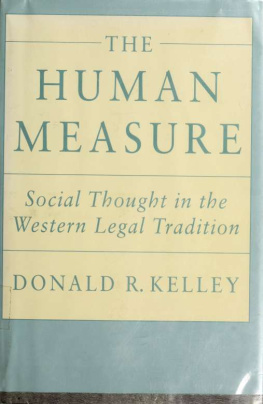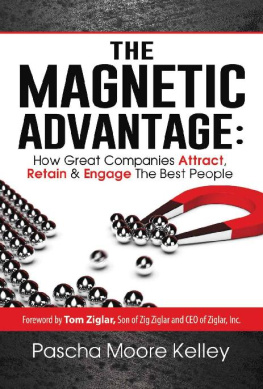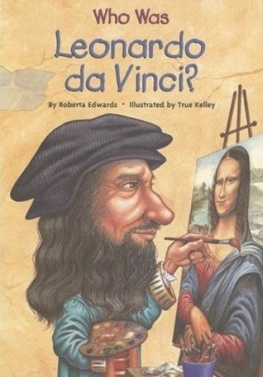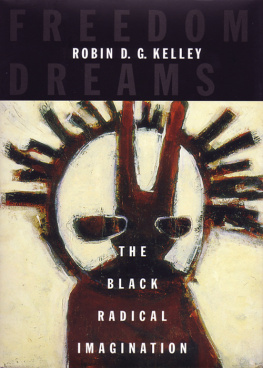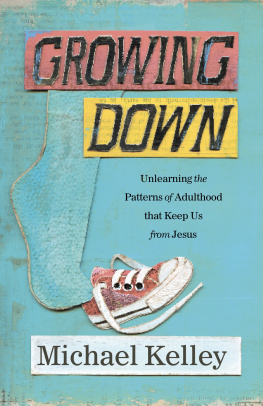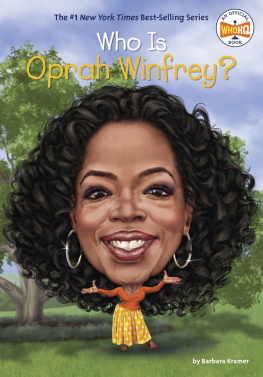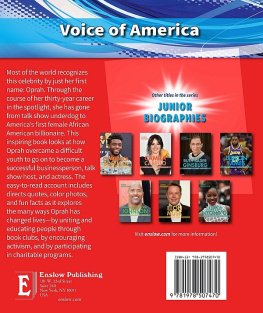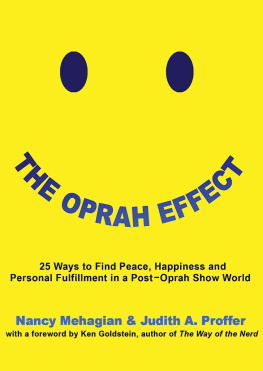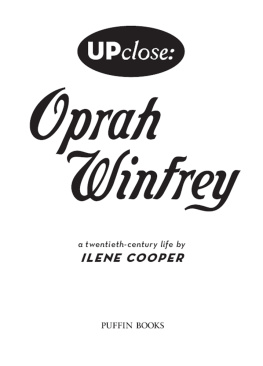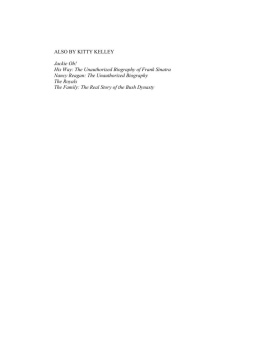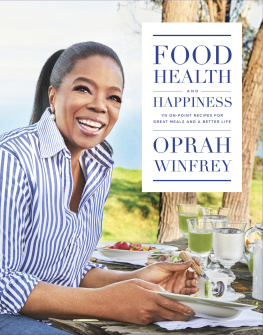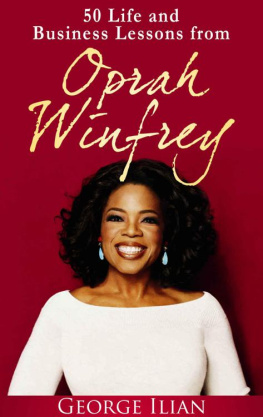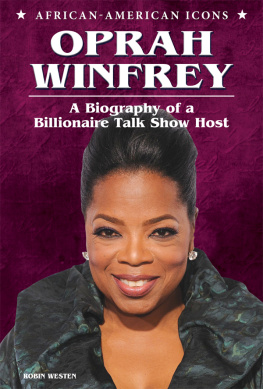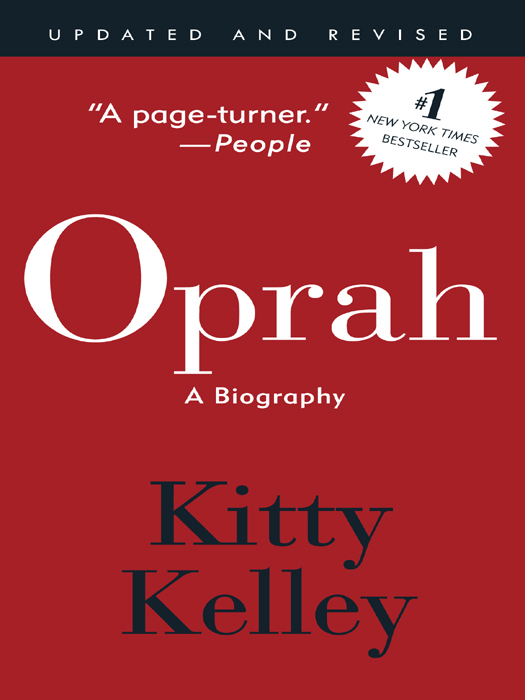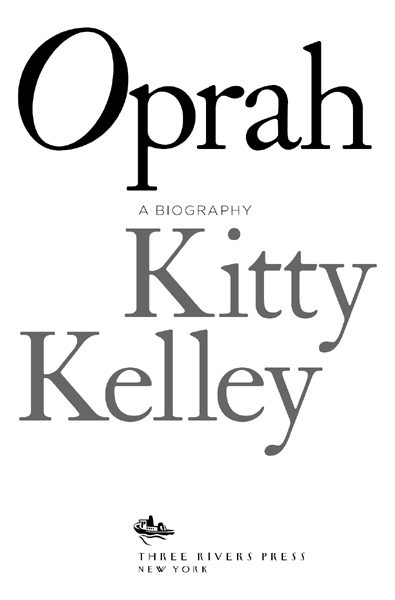ALSO BY KITTY KELLEY
Jackie Oh!
Elizabeth Taylor: The Last Star
His Way: The Unauthorized Biography of Frank Sinatra
Nancy Reagan: The Unauthorized Biography
The Royals
The Family: The Real Story of the Bush Dynasty
Copyright 2010, 2011 by H.B. Productions, Inc.
All rights reserved.
Published in the United States by Three Rivers Press, an imprint of the Crown Publishing Group, a division of Random House, Inc., New York.
www.crownpublishing.com
Three Rivers Press and the Tugboat design are registered trademarks of Random House, Inc.
Originally published in hardcover in slightly different form in the United States by Crown Publishers, an imprint of the Crown Publishing Group, a division of Random House, Inc., New York, in 2010.
Library of Congress Cataloging-in-Publication Data
is available upon request.
eISBN: 978-0-307-71877-8
COVER DESIGN BY DAVID TRAN
AUTHOR PHOTO BY BLACKMORE
v3.1
AGAIN AND ALWAYS
FOR MY HUSBAND, JOHN
Contents
Foreword
I MET OPRAH WINFREY when I was on a book promotion tour in Baltimore in 1981, and she was cohosting WJZs morning show, People Are Talking, with Richard Sher. We sat down before the show began, and as I recall, Richard did most of the talking, while Oprah seemed a bit standoffish, which I didnt understand until later. He interviewed me on the air and then joined Oprah on the set with a compliment about our lively exchange. Oprah shook her head with displeasure. I dont approve of that kind of book, she said. I have relatives she wrote a book about and they didnt like it at all.
I looked at the producer and asked what in the world she was talking about. I understood what she meant by that kind of bookan unauthorized biography written without the subjects cooperation or controlbut I was perplexed by her reference to my having written a book about her relatives. The only biography I had written at the time was the life story of Jacqueline Kennedy Onassis (Jackie Oh!), and my research had not turned up any Winfrey relatives in that family tree.
The producer looked slightly uncomfortable. Well Oprah is close to Maria Shriver, plus shes very much in awe of the Kennedys. I guess she considers herself part of the family in a way and she knows they were upset by your book because it was so revealing and well, thats why we decided to have Richard do your segment.
I jotted down the exchange on the back of my book-promotion schedule, just in case the publisher asked how things had gone in Baltimore. I had no idea that twenty-five years later Oprah Winfrey would be a supernova in our firmament, and I would devote four years to writing that kind of book about her.
For the last three decades Ive chosen to write biographies of living icons without their cooperation and independent of their control. These people are not merely celebrities, but titans of society who have left their imprint on our culture. With each biography the challenge has been to answer the question John F. Kennedy posed when he said, What makes journalism so fascinating and biography so interesting is the struggle to answer the question: Whats he like? In writing about contemporary figures, Ive found the unauthorized biography avoids the pureed truths of revisionist historythe pitfall of authorized biography. Without having to follow the dictates of the subject, the unauthorized biographer has a much better chance to penetrate the manufactured public image, which is crucial. For, to quote President Kennedy again, The great enemy of the truth is very often not the liedeliberate, contrived and dishonestbut the mythpersistent, persuasive and unrealistic.
Yet Ive never felt completely comfortable with the term unauthorized, probably because it sounds slightly nefarious, almost as if it involves breaking and entering. Admittedly, biography is, by its very nature, an invasion of a lifean intimate examination by the biographer, who tries to burrow into the marrow of the bone to probe the unknown and reveal the unseen. Despite my discomfort with the term, I understand why the unauthorized biography raises the hackles of its subjects, for it means an independent presentation of their lives, irrespective of their demands and decrees. It is not bended-knee biography. It does not genuflect to fame or curtsy to celebrity, and powerful public figures, accustomed to deference, quite naturally resist the scrutiny that such a biography requires. Oprah Winfrey was no exception.
At first she seemed sanguine when Crown Publishers announced in December 2006 that I would be writing her biography. She was asked her reaction, and her publicist responded, She is aware of the book but has no plans to contribute. Six months later Oprah told the New York Daily News, Im not cooperating with it, but if she wants to write a book, fine. This is America. Im not discouraging it or encouraging it. Then, with a wink, she added, And you know I can encourage.
By April 2008 she had changed her attitude. In a webcast with Eckhart Tolle, author of A New Earth, she said, I live in a world where people write things that are not true all the time. Somebodys working on a biography of me now, unauthorized. So I know its going to be lots of things in there that are not true.
I immediately wrote to Oprah, saying the truth was as important to me as it was to her. I repeated my intention to be fair, honest, and accurate, and again asked for an interview. I had written to her beforefirst as a matter of courtesy, to say that I was working on the book and hoped to present her life with empathy and insight. I wrote several times later, asking for an interview, but did not receive a response. I should not have been surprised, considering Oprah had written her own autobiography years earlier but withdrew it before publication because she felt it had revealed too much. Still, I kept trying, but after several more unanswered letters, I remembered what John Updike said when he was stonewalled by baseball great Ted Williams: Gods do not answer letters.
Midway into my research, I finally received a call from Oprahs publicist, Lisa Halliday, who said, Ms. Winfrey has asked me to tell you she declines to be interviewed. By then I had learned from Chicago reporters that Oprah had stopped giving interviews and responded to the press mostly through publicists rather than directly. If reporters persisted, as Cheryl Reed did when she was editor of the editorial page of the Chicago Sun-Times, Oprahs publicists provided a list of prepared questions and canned answers. [Oprah is] always asked the same questions, the publicist told Ms. Reed. [This is] how Miss Winfrey prefers to respond.
I told Ms. Halliday that I needed to be accurate in what I wrote and asked if Ms. Winfrey would be willing to check facts. Ms. Halliday said, If you have questions of fact, you can reach out to me. So I tried, but each time I called Harpo, Ms. Halliday was unavailable. In the end it was Oprah herself who turned out to be a major source of information.
In lieu of speaking to her directly and having to rely on fragmented memories, I decided to gather every interview she had given in the last twenty-five years to newspapers and magazines and on radio and television in the United States and the United Kingdom, including Canada and Australia. I filed eachand there were hundredsby names, dates, and topics, for a total of 2,732 files. From this resource I was able to use Oprahs own words with surety. Laid out on a grid, the information from these interviews, plus the hundreds of interviews I did with her family, friends, classmates, and coworkers, provided a psychological profile that I could never have acquired in any other way. Gathering these interviews given over more than two decades took considerable time, but once assembled and catalogued, they were invaluable in providing her voice. Throughout this book I have been able to cite Oprah in her own words, expressing her thoughts and emotions in response to events in her life as they occurred. Sometimes her public reflections did not jibe with the private recollections of others, but even the truths she shaved, as well as those she shared, added dimension to her fascinating persona.


